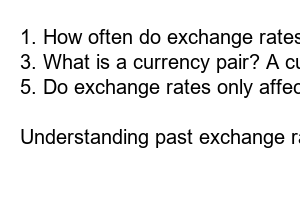과거 환율조회
Title: Exploring the Value of Exchange Rates: A Past Inquiry
Introduction:
Exchange rates play a crucial role in the global economy, impacting international trade, investments, and tourism. Understanding how exchange rates have evolved over time can provide valuable insights into economic trends and help individuals and businesses make informed financial decisions. In this blog post, we will delve into the historical background of exchange rates, examine their significance, and shed light on some common queries related to this fascinating subject.
1. The Genesis of Exchange Rates:
Exchange rates originated centuries ago as a means to ease international transactions, allowing currencies from different countries to be compared and exchanged. Initially, currencies were pegged to precious metals like gold, but as economies grew more complex, the adoption of centralized monetary systems led to the introduction of floating exchange rates.
2. Factors Influencing Exchange Rates:
Exchange rates fluctuate due to a multitude of factors, including interest rates, inflation levels, political stability, and international trade balances. When economic conditions change, currencies rise or fall in value relative to others, leading to shifts in exchange rates.
3. Historical Exchange Rate Movements:
Examining historical exchange rate data unveils intriguing patterns and significant events that have shaped currencies worldwide. From hyperinflation in post-World War I Germany to the impact of the 2008 global financial crisis, these occurrences have influenced exchange rates, often with long-lasting effects.
4. The Role of Central Banks:
Central banks play a crucial role in maintaining exchange rate stability. Through monetary policies such as interest rate adjustments and currency interventions, central banks can influence exchange rates to achieve economic goals. These measures aim to balance competitiveness, attract investments, and ensure price stability.
5. Exchange Rates and International Trade:
Exchange rates greatly impact international trade by affecting the competitiveness of a nation’s imports and exports. A weaker currency can make exports more attractive, stimulating economic growth, while a stronger currency may lead to increased imports and potentially hinder export competitiveness.
6. Exchange Rates and Travel:
Exchange rates significantly impact travel decisions, as they determine the value travelers receive for their currencies in foreign destinations. A favorable exchange rate can make a trip more affordable, whereas an unfavorable one may deter travelers or result in increased expenses abroad.
7. How to Track Exchange Rates:
Fortunately, staying informed about exchange rates is easier than ever. Numerous websites and mobile applications provide real-time exchange rate information, enabling individuals and businesses to monitor currency values and plan accordingly.
FAQs:
1. How often do exchange rates change? Exchange rates can fluctuate frequently, sometimes even within seconds, depending on market conditions and global events.
2. Can I predict future exchange rate movements? While not foolproof, various economic indicators and trends can help forecast exchange rate movements to some extent.
3. What is a currency pair? A currency pair represents the exchange rate between two currencies, with the first currency being the base and the second being the quote or counter currency.
4. Are exchange rates the same everywhere? No, exchange rates can vary between different banks, money changers, or even within the same institution at different times.
5. Do exchange rates only affect currencies used in international transactions? Exchange rates impact all currencies, even if they are primarily used domestically. This is because the value of a currency is relative to others.
6. How can I protect myself from currency fluctuations? Hedging strategies, such as currency swaps or forward contracts, can reduce the impact of currency fluctuations when conducting international transactions.
Summary:
Understanding past exchange rate movements and their implications is crucial for individuals and businesses alike. By considering historical trends, monitoring current rates, and comprehending the various factors influencing exchange rates, one can make better financial decisions and mitigate the potential risks associated with fluctuations in global currency markets.

